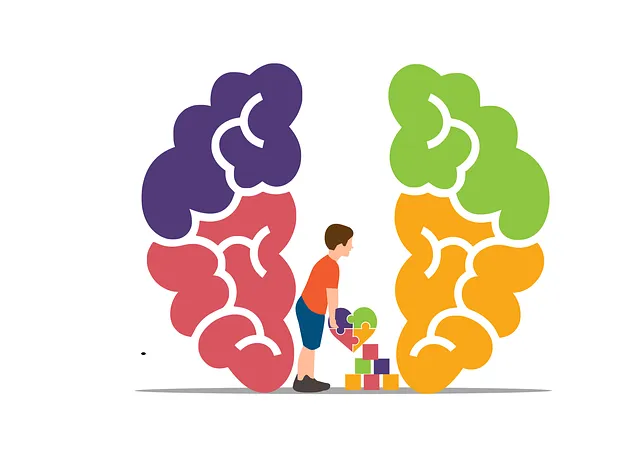The media's portrayal of mental illness significantly impacts public perceptions and societal responses, as demonstrated by research into Kaiser Permanente behavioral health services Englewood. Accurate and positive representations can foster empathy, challenge stereotypes, and influence stress management strategies within communities, especially for at-risk populations. Through diverse narratives and holistic approaches, this facility challenges negative stereotypes, promotes open dialogue, and normalizes conversations about mental health support. To ensure empathetically accurate portrayals, media creators should collaborate with experts from Kaiser Permanente behavioral health services Englewood, integrating real-life perspectives to avoid stereotypes and normalize self-care practices as essential components of mental health management. Community engagement and partnerships transform narratives, challenging stereotypes and empowering communities facing mental health challenges.
Mental illness representation in media significantly influences public perception, often perpetuating stereotypes or ignoring the complexity of these conditions. This article explores strategies to challenge these narratives, focusing on how organizations like Kaiser Permanente Behavioral Health Services Englewood are setting standards for accurate and empathetic portrayals. We discuss community engagement, collaboration with mental health experts, and creative approaches to reshape media depictions, ultimately fostering a more understanding society. Discover how these initiatives contribute to improving mental health support and services.
- Understanding the Impact of Media Portrayals on Mental Health Perception
- Kaiser Permanente Behavioral Health Services Englewood: A Model for Positive Representation
- Strategies to Enhance Accurate and Empathetic Media Depictions
- Community Engagement and Collaboration: Driving Change in Media Narratives
Understanding the Impact of Media Portrayals on Mental Health Perception

The media plays a powerful role in shaping public perceptions about mental health, often influencing how individuals understand and respond to various conditions. Portrayals of mental illness in movies, television shows, and news articles can either perpetuate harmful stereotypes or foster empathy and understanding. Research indicates that positive and accurate representations in the media can significantly impact how society views those struggling with behavioral health issues, such as those accessed through Kaiser Permanente behavioral health services Englewood.
When media depicts mental illness realistically and with sensitivity, it contributes to better stress management strategies within communities. This is particularly crucial for at-risk populations where risk management planning for mental health professionals can be enhanced by media influence. By presenting diverse narratives and characters experiencing various mental health challenges, the media can help build empathy among viewers, challenging them to consider these issues from different perspectives.
Kaiser Permanente Behavioral Health Services Englewood: A Model for Positive Representation

Kaiser Permanente Behavioral Health Services Englewood stands as a beacon of hope and accurate representation in media portrayal of mental illness. This facility offers a comprehensive approach to healthcare, focusing on both physical and mental well-being. By integrating burnout prevention strategies for healthcare providers, they ensure that staff are equipped to handle their own emotional regulation, fostering an environment conducive to patient care.
Through innovative programs targeting depression prevention and promoting emotional resilience, Kaiser Permanente Behavioral Health Services Englewood challenges negative stereotypes often associated with mental illness. Their commitment to positive representation extends beyond treatment; it’s a holistic approach aimed at educating the community about mental health, encouraging open dialogue, and normalizing conversations around sensitivity and support.
Strategies to Enhance Accurate and Empathetic Media Depictions

To enhance accurate and empathetic media depictions of mental illness, creators must prioritize authentic storytelling. This involves consulting with experts like those from Kaiser Permanente behavioral health services Englewood to ensure cultural sensitivity and clinical accuracy. By integrating real-life experiences and perspectives, media can move beyond stereotypes and clichés, fostering a deeper understanding among audiences.
Incorporating self-care practices and routines into narratives can further contribute to positive change. Depicting characters engaging in activities like mindfulness exercises, therapy sessions, or adopting healthy self-esteem improvement strategies allows viewers to see these behaviors as normal components of mental health management. This approach not only promotes empathy but also encourages audiences to consider self-care routine development for better mental health in their own lives.
Community Engagement and Collaboration: Driving Change in Media Narratives

Community engagement and collaboration are powerful tools for reshaping media narratives surrounding mental illness. By fostering partnerships between healthcare providers, such as Kaiser Permanente behavioral health services in Englewood, and community organizations, we can create more accurate and empathetic representations. This approach, known as Compassion Cultivation Practices, encourages open dialogues and promotes a deeper understanding of lived experiences.
Incorporating self-esteem improvement and emotional regulation techniques into these collaborations ensures that stories shared are not just informative but also empowering. By engaging diverse voices, media platforms can move beyond stereotypical portrayals and showcase the strength and resilience found within communities. This collaborative process is a game-changer in challenging negative perceptions, ultimately leading to more inclusive and supportive narratives for those facing mental health challenges.
Media has a profound impact on shaping societal perceptions of mental illness. By adopting strategies that promote accurate, empathetic, and diverse representations, we can challenge stigmatizing narratives. Kaiser Permanente Behavioral Health Services Englewood serves as a model for positive change, demonstrating the power of responsible media portrayal in improving mental health outcomes. Community engagement and collaboration are key to driving meaningful transformation in media narratives, fostering a more inclusive and supportive environment for those living with mental illness.






